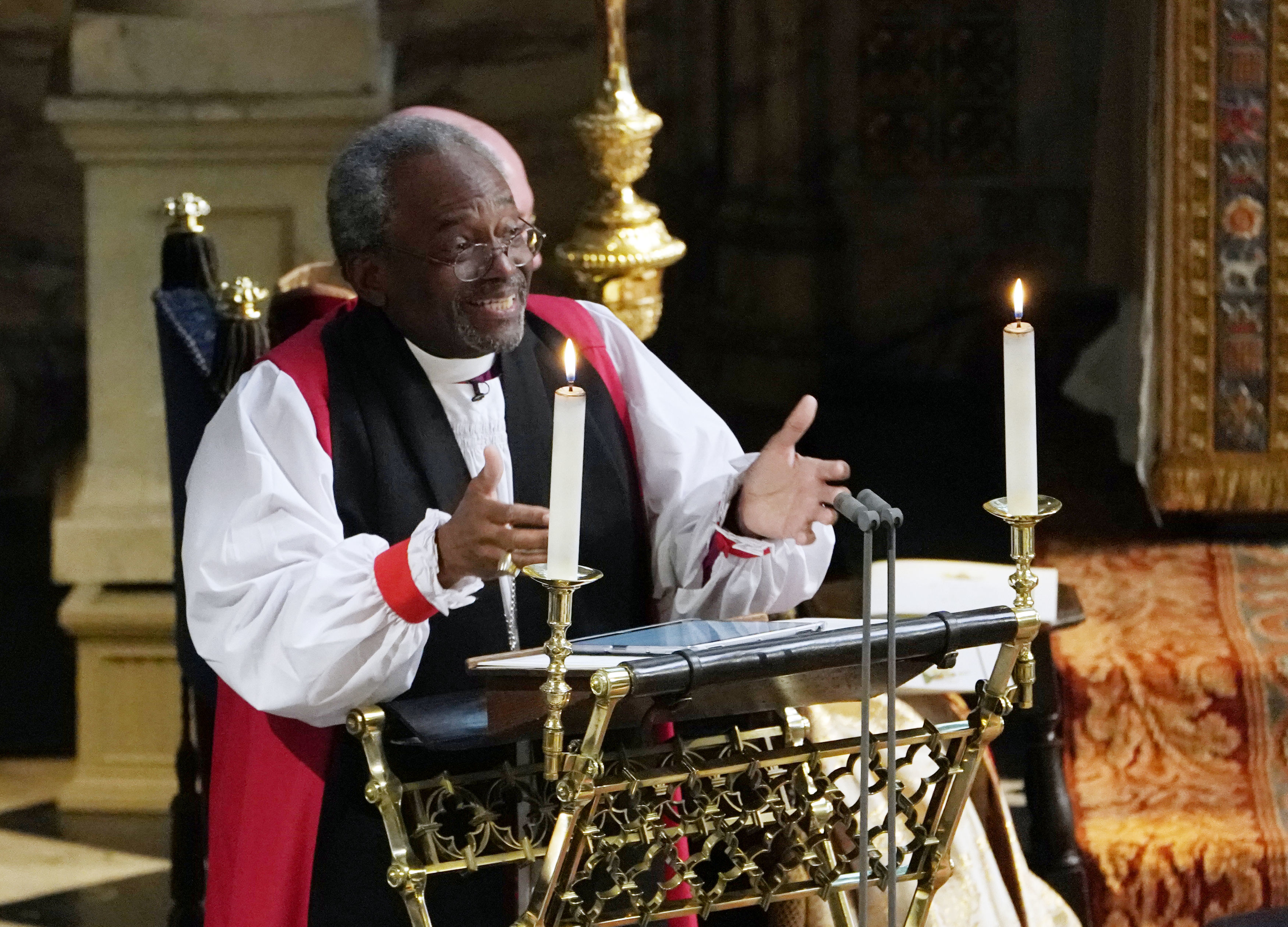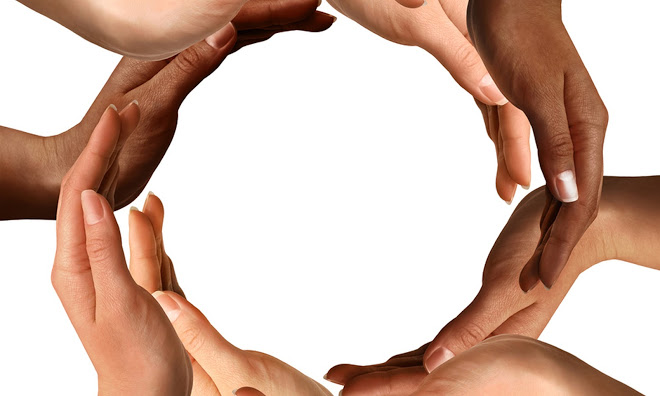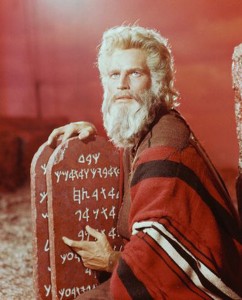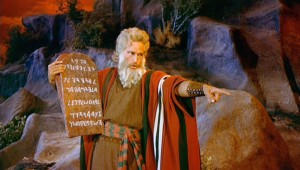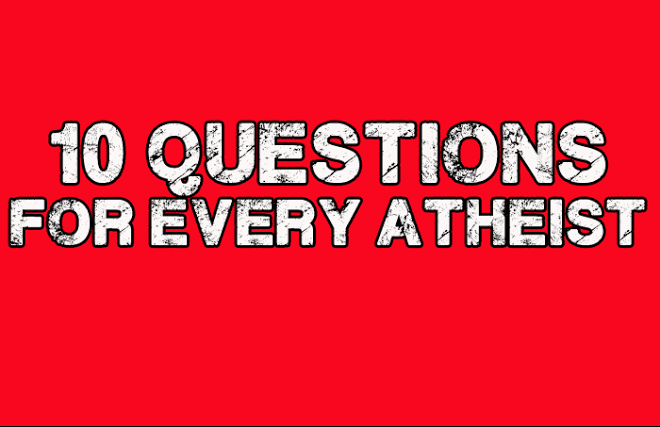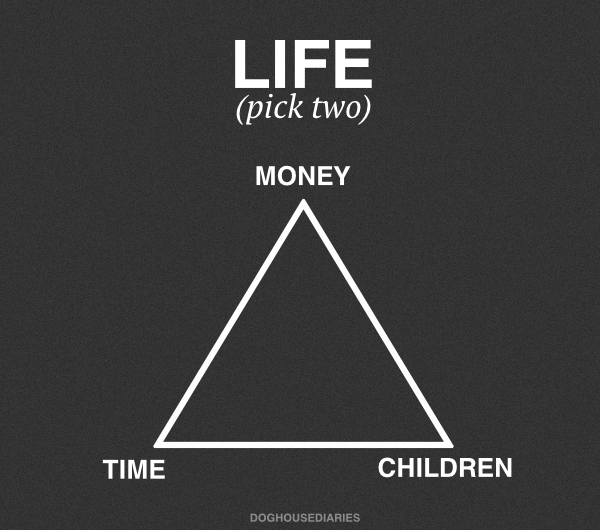I'm not an Atheist (but I've been accused of being one on the Internet).
3 And why beholdest thou the mote that is in thy brother's eye, but considerest not the beam that is in thine own eye?
4 Or how wilt thou say to thy brother, Let me pull out the mote out of thine eye; and, behold, a beam is in thine own eye?
5 Thou hypocrite, first cast out the beam out of thine own eye; and then shalt thou see clearly to cast out the mote out of thy brother's eye.
— Matthew 7:3-5
Y'know, once Christianity has its own house in order, I'll feel a lot better about Christians debating theology and the meaning of life with Atheists.
But when that happens, I hope there are a lot more clever questions brought to the table than these (http://todaychristian.net/10-questions-every-atheist) which have been making the rounds through my Google+ feed today. They are so simplistic as to be questionable (and questioned) even by someone who is not an Atheist. Which means I should probably answer them myself …
Some Questions Atheist Cannot Truly and Honestly REALLY Answer! Which leads to some interesting conclusions…
So lead off the discussion with snark. Not a terribly Christian approach. (And saying, "But they started it!" is hardly a Christian response, either.)
1. How Did You Become an Atheist?
Most atheists I know became one primarily by dint of reason, by looking at the world and determining that theistic answers didn't seem to explain it. But I may know some exceptional folk.
I'd turn the question around — how does anyone come to their worldview, including in the area of religion (or lack thereof)? We start with what we grow up with. At some point, some of us start questioning that (too few, I'd say), and reach sufficient conclusions to move in a conscious direction. And (one hopes) that process continues over the course of one's life.
There are plenty of people (including theists) who believe what they believe out of spiritual / intellectual laziness; that's how they were born, that's they way they'll die. Others run in a direction from emotion — anger, grief, joy; some join churches in doing so, others quit them. Some folk intellectually examine questions (though far fewer question their own assumptions) and try to reach conclusions; some of those folk come to answers all over the map regarding faith and theism.
Like Kierkegaard, I believe in the power of reason, but also in the "Leap of Faith" that reason cannot carry a believer past. That's why, ultimately, playing intellectual games with Atheists seems like a mook's game.
(This leaves aside the question of the influence of God on one's religious decisions. For an atheist, this is a meaningless question. For a theist, it raises the concern of free will vs. divine power, and what it means to have faith.)
2. What happens when we die?
I don't know, and anyone who can tell you they do know is looking to sell you something.
I have what my faith tells me, of course, as part of my belief in what happens. But the other thing I don't know is how much of that is simply something stemming from a desire for emotional comfort against the existential fear of dying.
I am willing to say that the objective evidence is that when we die, that's the ball game. If something happens to the self/soul after that, it is so far removed from our current world that there's little we can argue cogently about it (ghost stories notwithstanding).
3. What if you’re wrong? And there is a Heaven? And there is a HELL!
(Then hopefully they'll punctuate more correctly there.)
Or, to give an equally hoary response to Pascal's Wager, "What if you're wrong and the Hindu pantheon is really running everything?"
My personal take is that if there is an Afterlife (which I believe, though not as orthodox a one as I suspect the original poster has in mind), I'm going to be begging for forgiveness anyway. I figure an Atheist can do so as well as any other person. Standard Christian theology generally has it that it is by grace we are saved, not by any particular actions or worthiness on our part.
In other words, if there is an Afterlife where we will be judged, I find it difficult to believe that it will be based on our doctrinal rectitude.
4. Without God, where do you get your morality from?
From a mail-order morality shop in Poughkeepsie …
(Sorry, an old writing joke.)
The question can be taken two different ways. If the question is, "If you don't believe in God, how can you be moral?" then one can simply look at the atheists of the world, and the theists (of greatly varying stripes), and determine whether there is a substantive difference in moral behavior between them (see also the next question).
It doesn't seem to me that there is.
Arguably, comparing Atheists in the US to (narrowing it down) Christians in the US may not be fair, since the former were raised and live in a culture that is heavily inculcated in Americanized Christian morality. But one can look at Atheists in non-Christian societies around the globe, or in lands where the predominant religion is not theistic as we generally consider it (Buddhism, for example), without seeing that Atheists or their societies are clearly less moral.
One can find moral (or altruistic) behavior in certain primates, too, for what that's worth.
The other way of interpreting this question is per the next question.
5. If there is no God, can we do what we want? Are we free to murder and rape? While good deeds are unrewarded?
We can already do what we want, whether there is a God or not. Human history makes that clear. People who do what the Bible considers bad things do not always suffer divine punishment here on Earth; ditto for those who do virtuous things. The rain falls on the just and unjust alike. (And that doesn't get into the question of faith vs works or the necessity of grace.)
The question is, what if we don't believe there are any consequences in the Hereafter? Would we see widespread killing and sexual assault?
I do personally believe in divine justice (and mercy) (and education) in the Afterlife, but as there is only teaching / preaching about it here in this world, there's no particular way to prove it.
It's worth noting that "murder and rape" have been done in the Name of God. Indeed, looking at the Old Testament, it's sometimes ascribed to His orders.
It's also worth noting that, in a country that has seen a steady rise in Atheism and disbelief, a country where the most publicly devout Christians have been decrying our increasingly secular ways, murder and rape rates have been in a steady decline. I don't think that Atheism makes one more moral; I'm suggesting that it may not make one less moral insofar as living in society goes. Because murder and rape (with very fuzzy boundaries over what actions constitute those categories) seem to be pretty universally condemned across human cultures, by both religious and civil authorities, regardless of the particular belief system in play. While one could conceive of a nihilistic atheism that permits such actions, it seems unlikely that human societies would generally allow the disorder that would ensue if everyone did it.
That's not to say that religious teachings cannot have an effect on behavior (hopefully for the better). But I would add that, as a Christian, I am called to behave morally, not for fear of Hell, nor promise of Heavenly reward, but because it's what God wants me to do.
6. If there is no god, how does your life have any meaning?
Does my life have meaning only because of God? How does that work?
Because I do believe an Afterlife, there is meaning for me in terms of continuity of existence and relationship to God. But I also get meaning out of my relationship to those around me. Jesus' "greatest commandments" focused not just on God but on one's neighbor. Meaning can clearly be derived from relationship with neighbor — family, friends, colleagues, passersby, immediate relationship and future relationship after I'm gone (walked away, moved away, or passed away).
It seems to me that meaning for an Atheist can focus on those latter aspects. I won't try to argue whether that's sufficient, because the search for meaning in life is a highly subjective discussion that, if nothing else, requires beer for lubrication. But I don't feel in a position to tell people that their lives are meaningless if they don't believe in some sort of deity, let along a particular one.
7. Where did the universe come from?
Why does it have to have come from somewhere?
I mean, from a faith standpoint, standing in comparison to an omniscient, omnipotent, eternal God, it seems to make very little difference whether the universe was created in a single Fiat Lux (billions of years ago or thousands) or whether it has always been there, or whether the question of causality and existence are in the least bit related. The idea of a Prime Mover Unmoved is attractive to the human mind, but so is Newtonian Physics in general, and we understand already that the universe is a lot more complicated than that.
To date, there's nothing in the current science of cosmology that seems tor require a deity to push the first domino, aside from our feeling that there has to be a first domino that therefore requires Someone to push it. I don't have a problem ascribing divine presence and meaning to the existence of the universe, but there's nothing I can point to that seems to only work if there is such presence and meaning.
8. What about miracles? What all the people who claim to have a connection with Jesus? What about those who claim to have seen saints or angels?
What about those who claim to have found enlightenment through contemplation of the Buddha? Or those who feel they have been touched by Vishnu? Or those who claim to have a connection with Allah? Or those who are convinced that the Tarot predicted which horse they should bet on in the sixth? Or those who feel that their dead spouse is there at night, filling them with a sense of comfort (or dread)? Or those who truly believe they are the reincarnation of someone else?
People believe a lot of things. People are convinced of a lot of feelings. They can't all be right.
I have had personal religious experiences that, for me, are convincing, but not in any objective sense that could (or should) convince anyone else. That's why they're my experiences. Nor do they guarantee that, if I'm right about that experience indicating that God exists that anything else I pontificate on, spiritually, is correct.
If God meant miracles to be conclusive, contemporary proof that would convince everyone of the reality of His existence … one would expect Him to do so in far more prominent and unambiguous a fashion. Fiery letters in the sky, a personalized platinum set of Ten Commandment tablets appearing under the pillow one morning, a star that appears in the heavens every December 25th and then falls to earth and cracks open to reveal the inscription "JESUS IS THE REASON FOR THE SEASON," three free wishes every time you go to church — whatever. One can only conclude from this not happening that:
a. God isn't all that hot on miracles these days, preferring people to come to faith from teachings, examples of the lives of faithful, and the "small still voice" within each person.
b. God doesn't exist.
c. Some other reason.
So … not much help there.
9. What’s your view of Dawkins, Hitchens and Harris?
I can't speak for Atheists here, though I know some who go ga-ga over some of the above, others who find them abrasive and unhelpful to the cause, and others who have (more appropriately) mixed feelings.
Speaking for myself, I think that most of the "super-star" atheists today have some valuable things for people (of faith and without) to hear, but are also (as super-stars often are) more obnoxious in how they do so than I would be. But I tend to be a pretty nice guy, rhetorically, so I'll confess that's just my reaction.
Regardless, the gents in question are not considered gurus or religious leaders by most of the Atheists I know.
10. If there is no God, then why does every society have a religion?
If flags are just made of cloth, why are wars fought with them and people willing to die for them?
Humans are funny critters, and religion is a meme that has a lot of reasons behind it. There are some neurological and psychological foundations for certain religious experiences and needs. Religion provides comfort and (at arm's length) explanation for things, from lightning to grief. Religion can be deeply emotional, making it very difficult to be rid of, and something that seeps into societies around it. Religion serves a role in social grouping and tradition and structure. It can also be a tool of authority and compliance by the state. So … lots of reasons why religion is so universal and so persitent.
One might as well ask, though, "Why, if there is no God but the LORD, do so many societies believe in someone (or ones) else?" Fractionally less than a third of the global population is Christian, though they are a plurality. Does that "prove" anything? Not that I can tell.
So … I don't know if anything is proven, either, by my commentary. Or, for that matter, by any Atheists who choose to respond to the Ten Questions. Far from being questions that cannot be "truly or honestly answered" by Atheists, I suspect anyone who's given much thought to their belief system (whatever it may be) will not be particularly daunted by any of them.
That said, I'm sure it makes the readers of Today Christian feel a happy smugness to have them in their back pocket to spring on unbelievers, in the expectation of confusion and/or instant conversion. I look forward to hearing how that goes for them.
(h/t +George Wiman, among others)
View on Google+
